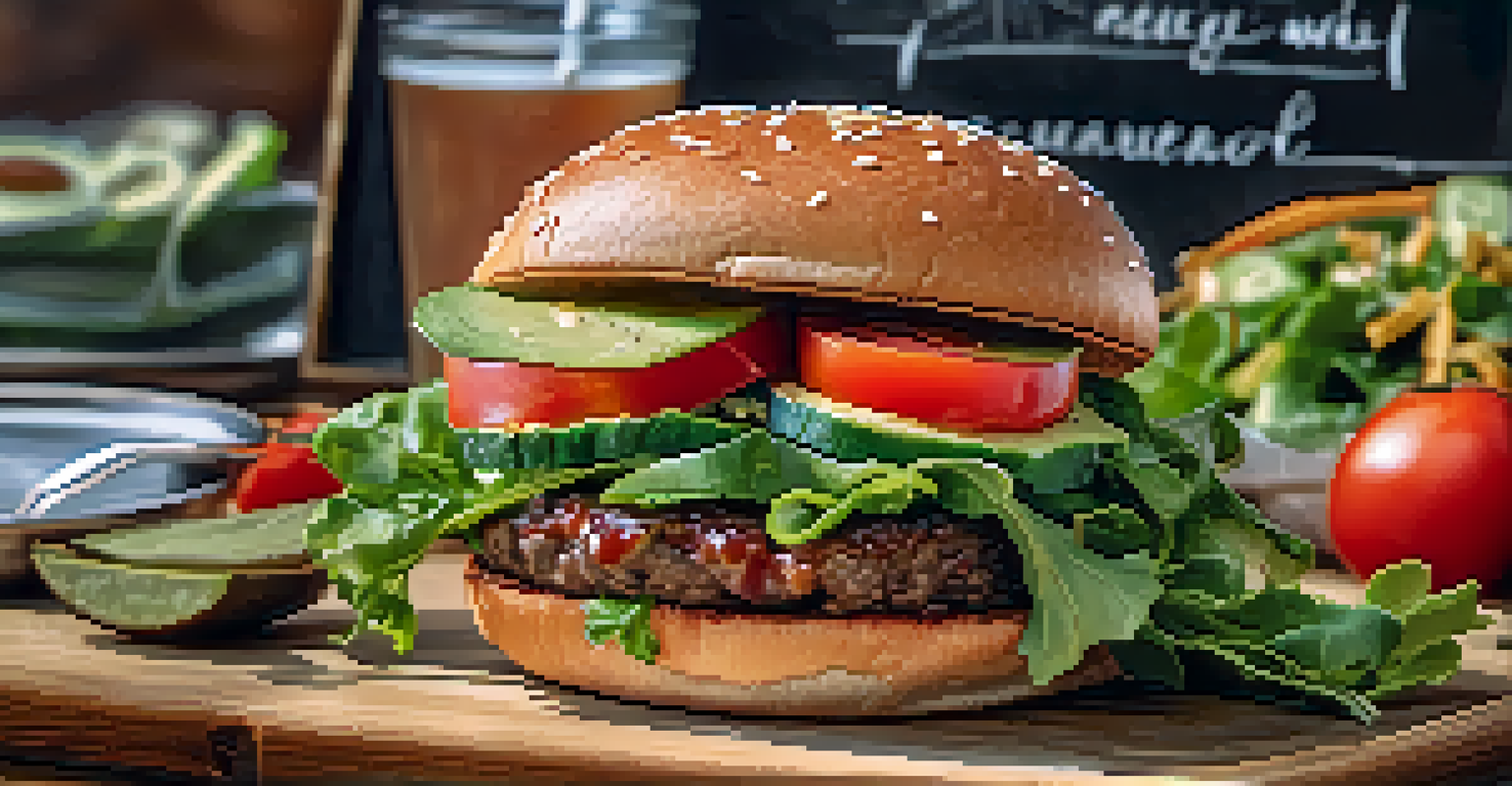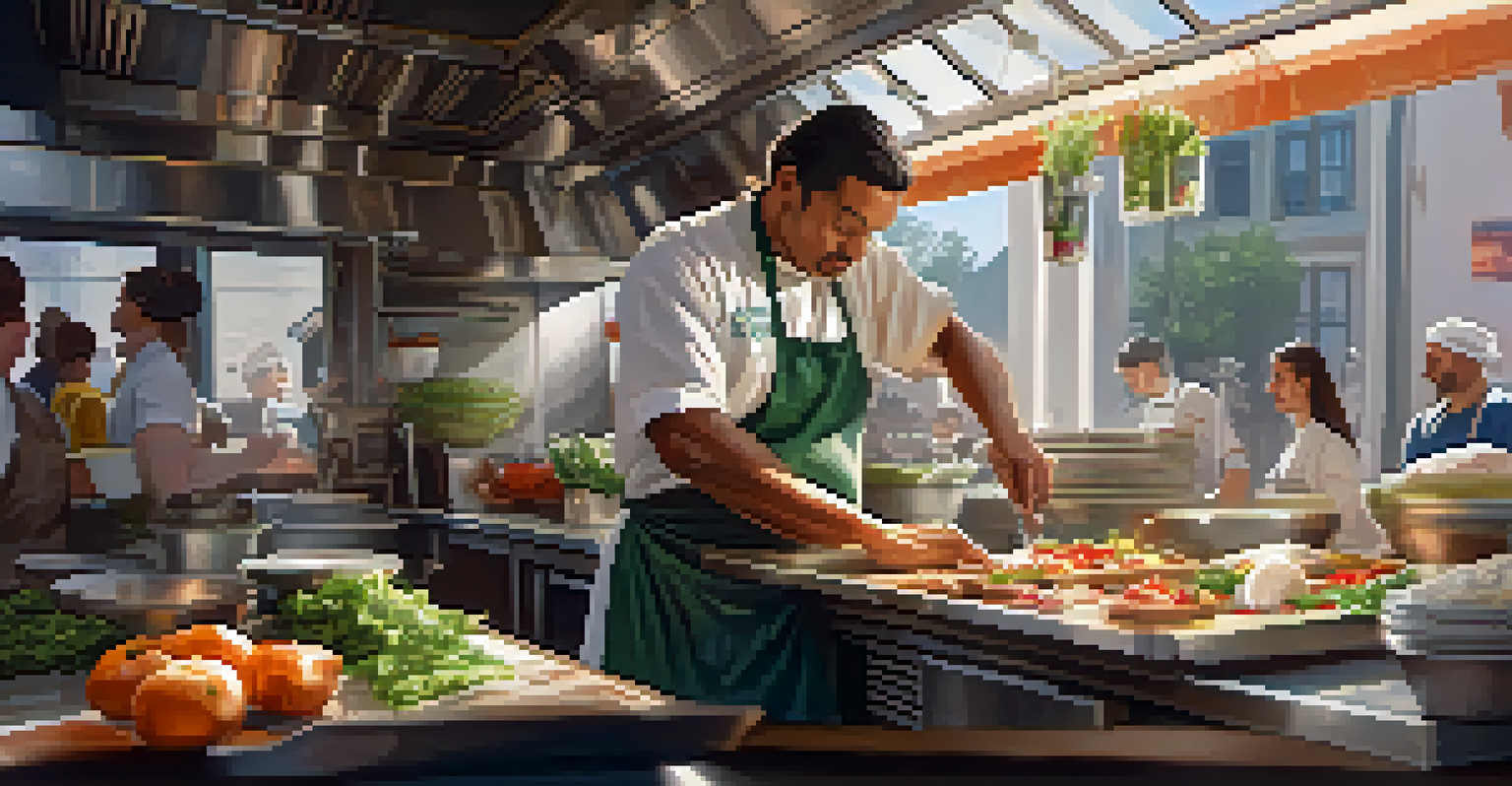Food Trucks: Culinary Innovation on Wheels Across America

The Rise of Food Trucks: A Delicious Revolution
Food trucks have transformed from humble beginnings into a culinary phenomenon across America. Once seen as simple carts serving hot dogs and tacos, they now showcase diverse cuisines and innovative dishes. This evolution reflects a growing desire for unique dining experiences and the convenience of street food.
Food is not just what we eat, it's a way of connecting with others, sharing experiences, and celebrating culture.
Thanks to social media, food truck culture has gained immense popularity, with enthusiasts eagerly following their favorite mobile eateries. Platforms like Instagram and Twitter have allowed food trucks to showcase their vibrant dishes, creating a community of followers. This digital presence has not only boosted sales but also encouraged culinary creativity.
The rise of food trucks has also opened doors for aspiring chefs and entrepreneurs who might not have the resources for a traditional restaurant. With lower startup costs and the freedom to experiment with menus, food trucks provide a platform for culinary innovation. It's no wonder that many food trucks have gained loyal followings and even transitioned into brick-and-mortar locations.
Culinary Diversity: A Taste of Global Flavors
One of the most exciting aspects of food trucks is their ability to offer a cornucopia of global flavors. From Korean BBQ tacos to gourmet vegan burgers, the food truck scene is a melting pot of diverse cuisines. This fusion not only satisfies adventurous eaters but also brings communities together through food.

Many food trucks take pride in using locally sourced ingredients, showcasing the best of regional produce and meats. This commitment to quality not only enhances flavor but also supports local farmers and businesses. Diners can feel good about enjoying a meal that’s both delicious and sustainable.
Food Trucks: Culinary Innovation Hub
Food trucks have evolved into platforms for culinary creativity, allowing chefs to showcase diverse cuisines and unique dishes.
Moreover, food trucks often experiment with seasonal menus, which keeps the offerings fresh and exciting. For instance, a food truck may feature a pumpkin spice dish in the fall or refreshing salads in the summer. This adaptability is part of what makes food trucks a vibrant addition to the culinary landscape.
The Role of Community in Food Truck Culture
Food trucks are not just about the food; they play a vital role in building community connections. Local events, festivals, and markets often feature food trucks, creating a lively atmosphere where people can gather and enjoy diverse culinary offerings. This fosters a sense of belonging and inclusivity among diners.
The best part of food is that it brings people together, no matter where they come from.
Many food truck owners actively engage with their customers, forming relationships that turn first-time visitors into regulars. This personal touch can make a meal feel more special, as customers often appreciate the stories behind their food. The warmth and friendliness of food truck operators create a unique dining experience.
Additionally, food trucks often collaborate with local businesses, such as breweries or art galleries, to create special events. These partnerships not only promote the food truck but also support the local economy. By working together, they cultivate a vibrant culinary scene that benefits everyone involved.
Innovative Menu Creations: Pushing Culinary Boundaries
The creative freedom that comes with running a food truck allows chefs to push the boundaries of traditional cuisine. Many food truck menus feature playful twists on classic dishes, such as mac and cheese sandwiches or sushi burritos. This innovative spirit attracts food lovers eager to try something new and exciting.
Food trucks also excel in limited-time offerings and specials that keep customers coming back for more. By experimenting with unusual ingredients or techniques, food truck chefs can create buzz and anticipation among their followers. This dynamic approach not only showcases their culinary skills but also keeps the menu fresh.
Community Building through Food
Food trucks foster community connections by participating in local events and forming relationships with their customers.
Moreover, food trucks often participate in competitions and festivals, showcasing their creativity to a wider audience. These events can lead to recognition and awards, elevating a food truck's status in the culinary world. It's a testament to how these mobile kitchens are not just about convenience but also culinary mastery.
Challenges Faced by Food Truck Entrepreneurs
While the food truck industry is exciting, it comes with its own set of challenges. Operators must navigate local regulations and permits, which can vary significantly from one city to another. This bureaucratic maze can be daunting, especially for first-time entrepreneurs trying to make their mark.
Weather is another unpredictable factor that food truck owners must contend with. Rainy days or extreme heat can deter customers and impact sales. As a result, food truck operators often need to think creatively about marketing and adapting their services to different conditions.
Lastly, competition in the food truck scene can be fierce, with many trucks vying for the same crowd. Standing out requires not only great food but also a solid brand identity and social media presence. Successful food truck operators are those who can navigate these challenges while maintaining their passion for culinary innovation.
Sustainability on Wheels: Eco-Friendly Practices
Many food trucks are embracing sustainability, focusing on eco-friendly practices that reduce their environmental impact. This includes using biodegradable packaging, sourcing ingredients from local farms, and minimizing waste through composting. These efforts resonate with environmentally conscious consumers who want to make responsible choices.
Food trucks often have the flexibility to pivot their menus based on seasonal availability, which not only supports local agriculture but also reduces the carbon footprint associated with transportation. By prioritizing local ingredients, these mobile kitchens help promote a more sustainable food system.
Sustainability in Mobile Dining
Many food trucks are adopting eco-friendly practices, such as using local ingredients and biodegradable packaging, to reduce their environmental impact.
Additionally, some food trucks incorporate green technologies, such as solar panels or energy-efficient cooking equipment. These initiatives demonstrate a commitment to sustainability that can attract customers who value environmentally friendly practices. In a world increasingly concerned about climate change, food trucks can lead the way in responsible dining.
The Future of Food Trucks: Trends to Watch
As the food truck industry continues to evolve, several trends are emerging that could shape its future. One notable trend is the rise of digital ordering and delivery platforms, which allow food trucks to reach a broader audience. This shift not only enhances convenience but also opens new revenue streams for operators.
Moreover, the integration of technology, such as mobile apps and contactless payments, is becoming more prevalent. These innovations streamline the ordering process and enhance customer experience, making food trucks even more appealing. As technology advances, it will be interesting to see how food trucks adapt to meet changing consumer preferences.

Finally, we can expect to see more food trucks embracing health-conscious menus and dietary options, such as gluten-free or plant-based dishes. As diners become more health-aware, food trucks will need to cater to these preferences while maintaining their innovative spirit. This adaptability will be key to the continued success of food trucks across America.